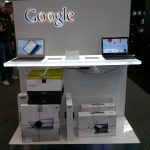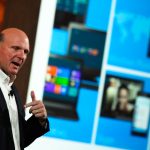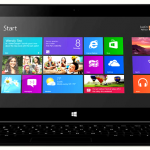Why I love Chromebook

Third in a series. For Valentine's Day, Wayne Williams and I explained why we love Kindle and Surface Pro, respectively. We've decided to extend the concept into an ongoing series, which I continue about Chromebook and in many more ways Chrome OS.
My Chromebook journey began in December 2010 when Google dispatched 60,000 Cr-48 test units. I used the computer as my primary PC for a week, but no more, being a concept. But, then, my 11.6-inch MacBook Air failed in March 2011, and I reverted back to the Cr-48 during the emergency. In June 2011, Samsung released the Series 5 Chromebook, which I used as my only PC for two solid months. But performance couldn't meet my needs -- that is until the successor, the 550, launched in May 2011. I abandoned MacBook Air and didn't look back. Performance and features met my needs. I traded performance for better ergonomics when switching to the ARM-based Series 3 Chromebook in October.
Twenty-percent of dollars spent on consumer technology goes to Apple

No wonder Google wants to open retail stores and sell more gadgets. Apple's reach is enormous, which is as important for the brand as making mullah -- and there is a whole lot of that. According to NPD, the fruit-logo company accounted for 19.9 percent of all US retail consumer technology sales last year, up from 17.3 percent in 2011.
Samsung ranked second, accounting for 9.3 percent of sales, up 2 points year over year. HP (8.2 percent), Sony (4.4 percent) and Dell (3 percent) rounded out the top five.
Ubuntu tablet challenges Android, BlackBerry, iOS and Windows

Developers looking for Ubuntu on smartphones will get a second treat on February 21. Today, Canonical revealed a build for tablets. Supported testing devices for both platforms: Galaxy Nexus, Nexus 4, Nexus 7 and Nexus 10. Ubuntu replaces Android, not runs alongside or dual-boots with it.
"Ubuntu tablet" supports multi-touch slates running dual-core ARM A9 processor with 1GB of RAM and 8GB storage. However, Canonical's ambitions are greater for commercially-shipping products: dual-core A15 processor and 2GB RAM for 7-to-10 inch tablets and quad-core A15 or x86 processor and 4GB of RAM for 10-to-12 inch slates. The specs reveal plans to compete with touch ultrabooks or tablet hybrids like Microsoft Surface Pro. The operating system supports up to 20-inch tablets. However, lower-end tablets will be a priority.
Microsoft takes Outlook live

Perhaps "live" is a poor choice of words, seeing as Windows Live is dead. Early this morning, Microsoft took down the "opening soon" sign and brought Outlook -- that's the .com not the software -- out of beta. The webmail service is in "grand opening" mode with 60 million "active users" in tow, and more coming as they migrate from Hotmail.
Microsoft unveiled the email service nearly six months ago, decked out in Windows 8-logo blue and generous white space. During the beta process, Outlook ran alongside Hotmail. But with the new service launched, "we'll soon start to upgrade hundreds of millions of Hotmail users to the new Outlook.com experience", David Law, Outlook.com product management director, says.
Ubuntu countdowns to tablet time

Earlier today, colleague Wayne Williams wrote about Canonical plans to publish images and open-source code for the Touch Developer Preview of Ubuntu for Galaxy Nexus and Nexus 4. Look for them Thursday. Meanwhile, Canonical prepares another trick, posting a countdown clock to "tablet time". Oh my.
In October 2011, Canonical CEO Mark Shuttleworth promised Ubuntu would appear on smartphones, tablets and TVs. The company formally announced the smartphone OS in January, with plans to make it available for older Android handsets, at the least. I wonder if Canonical would take a similar approach to tablets.
Microsoft NEEDs a Mobile Manhattan Project

"We didn't miss cell phones, but the way that we went about it, ah, didn't allow us to get the leadership. So it's clearly a mistake." That's the chilling admission from Microsoft Chairman Bill Gates during a CBS This Morning interview with Charlie Rose (Editor: full interview from January 30). Referring to CEO Steve Ballmer, the cofounder emphasizes: "He and I are not satisfied that in terms of, you know, breakthrough things, that we're, ah, doing everything possible". You think?
Hallelujah! Praise the Lord (or whomever or whatever you worship, if anything). Change starts with admission of fault, and Gates gives it. So what should Microsoft do about the problem? Take my advice. Please. Starting five years ago, I repeatedly recommend Microsoft lunch a Mobile Manhattan Project -- on the order of Internet Explorer in the mid-1990s but only much, much larger. There simply is no other way to catch up in mobile.
Microsoft bundles tempt Surface Pro buyers

Yesterday, I spent about 45 minutes at Microsoft Store San Diego, which was busy -- sight not seen since Kinect's November 2010 launch. Shoppers came to see Surface, and there were lots of questions and explorations of both tablets, although clearly Pro was the draw. Unfortunately, only the 64GB model is in stock, which somewhat muted sales, or so I observed.
If Surface is a failure, as so many bigmouths on the InterWebs claim, what company wouldn't want one like this? There are many measures of success in retail, and just getting people in the door is one of them. Once inside, shoppers may buy something, or walk out feeling better about the brand, leading to sales of something else later on. "Jesus! Can you believe that Microsoft? Baby, you shop here for my birthday!"
Of course Microsoft limits Office 2013 rights

I'm not surprised about the weekend furor over changes to Office 2013 retail licensing terms. Gregg Keizer, writing for Computerworld, has done some of the best reporting on this topic. He deserves your pageviews, starting with this story. I can confirm what he writes, that the new End User License Agreement restricts usage to one PC and isn't transferrable. Whether or not Microsoft actually enforces the provision, or changes it, is another matter. We'll see.
What does perplex me: Why there is no backlash about other licensing term changes that are considerably more onerous and costly. Like I explained last month, "Microsoft really doesn't want you to buy Office 2013". That is the reason for all these licensing changes. The company wants consumers to purchase Office 365 instead.
Yes! Google should open retail stores

I can't say if rumors flashing across the InterWebs yesterday are true about Google opening retail shops this year. Not that it matters. The search giant should open stores -- and lots of them. Timing is right, too, and who could have imagined two or even three years ago.
Make. No. Mistake. In the 22 months since returning as CEO (following a 10-year hiatus), Larry Page has injected new vim, vigor and vibrancy into the Google empire. The company is now one of the most disruptive forces across techdom. Android Market branding to Google Play, Google+, Google Now, Nexus tablets, low-cost Chromebooks and stores selling them inside major retailers all debuted during his watch. Then there is ever-tightening cross-integration of products and services creating one of the most formidable cloud applications stacks available anywhere. Google Now, Google Play and Android and Chrome OS devices are reasons enough for retail stores, because the company has a digital lifestyle to sell.
Steve Ballmer should step up, or ship out

Fifteen days using Surface Pro as my primary PC, I must say that I really, really like the tablet. Windows 8, the same. Ditto for Bing and Internet Explorer. I'm no stranger to using Microsoft products or services. But I am new to them being presented and consumed the way the company intends. The experience is refreshing and exhilarating, yet depressing. Who will know, with so much attention going to Android and iOS devices, or nimbler competitors offering more compelling products or services at faster pace?
Microsoft's problems aren't new, and that is the problem. This morning I reread my December 2009 post: "Microsoft isn't losing its consumer edge, it was game over long ago". I'm disturbed how little has changed, so much that, except for the lead paragraph, I could repost with new headline and the content would still be relevant. I will lift some parts here, as I offer, for the umpteenth time, remedies to Microsoft's woes.
Why I love Surface Pro

First in a series. I have loved many computers and gadgets over the years. They typically share two things in common: Initial "Wow" reaction and improved experience the longer used. Microsoft Surface Pro gets the first, but more time is needed on the second. February 14 marks my fourteenth day using the tablet.
Too often tech vendors put too much emphasis on features while missing something more fundamental: Joy. How do you feel using the product. Does it make your life better? Are you happier for using the thing? Design -- how a product looks and the interaction with it -- is paramount. Apple products, for example, are pretty for a reason. On this Valentine's Day, after two weeks with Surface Pro, love is appropriate topic. Because the tablet makes me feel good.
Tech toys I love more than my wife (but don't tell her)

Valentine's Day is all about romance, but whom -- or what -- do you really love? The stereotypical geek fawns over his or her gadgets and spends hours on PC (smartphone or tablet) instead of being with family or friends. Surely that describes you, and me, for that matter.
On this day of Cupid's arrows, I confess where they struck gadgets and other goodies and bound us in everlasting love. Take my wife, please, but leave my tech toys. She'll understand -- ah, right?
There is little room for a third smartphone platform

"We're No. 3!" will be BlackBerry's and Microsoft's rallying cry this year. Android and iOS so dominate the smartphone market, the best -- and quite honestly dismal -- hope is third; distant at that. Combined, based on actual phone sales, Android and iOS had 90.1 percent share during fourth quarter, up from 74.9 percent a year earlier, according to Gartner. BlackBerry and Windows Phone are neck-and-neck, with lowly 3.5 percent and 3 percent standings, respectively.
Upstarts want third place, too. Anshul Gupta, Gartner principal research analyst, explains: "2013 will be the year of the rise of the third ecosystem as the battle between the new BlackBerry10 and Widows Phone intensifies. As carriers and vendors feel the pressure of the strong Android’s growth, alternative operating systems such as Tizen, Firefox, Ubuntu and Jolla will try and carve out an opportunity by positioning themselves as profitable alternatives".
Internet Explorer is the last browser standing

Opera's decision to change rendering engines means three of the top five browsers will use Webkit. Internet Explorer stands alone, and that is the wrong place to be. In September 2009 post "Microsoft should dig deep into Webkit to keep Google from Framing IE", I suggested radical change, which unsurprisingly was ignored. Since, Chrome usage share grew from 2.9 percent in August 2009 to 17.84 percent in January 2013, according to Net Applications. Meanwhile, IE share fell from 66.97 percent to 55.14 percent.
But the real battleground, and where upstarts gobble up territory, is mobile -- yeah smartphones and tablets. While the category accounted for just 11.8 percent browser usage share in January, the majority is Webkit -- 61.02 percent just for Safari. Internet Explorer: 1.34 percent, or less than Chrome (2.02 percent). Android browser is 21.46 percent. As I expressed three-and-a-half years ago: "Microsoft should answer WebKit for WebKit, by releasing a new browser based on a new rendering engine; put on the IE brand and ship it for desktop and mobile". There's still time, but fast running out.
Jawbone warns MyTalk hacked

There are days that cloud computing really sucks. The problem is trust. You trust Sites X, Y and Z to protect your data and log-in credentials, then they don't. Last week, Twitter rudely informed me that my password had to be reset, which is passive way of admitting that mine was one of the 250,000 pilfered accounts. This morning Jawbone greeted with email about an "isolated attack" that snagged my MyTalk information.
Funny thing, I don't even use MyTalk. I opened an account years ago while testing a Jawbone Bluetooth earpiece. Supposedly there was a firmware update and MyTalk registration the only way to get it. Fooled! No update. Now the dormant account is hacked. Interestingly, I see no official statement on Jawbone's website, but the email absolutely looks authentic.
Joe's Bio
Joe Wilcox is BetaNews executive editor. His motto: Change the rules. Joe is a former CNET News staff writer, JupiterResearch senior analyst, and Ziff Davis Enterprise Microsoft Watch editor.
Ethics Statement© 1998-2025 BetaNews, Inc. All Rights Reserved. About Us - Privacy Policy - Cookie Policy - Sitemap.
